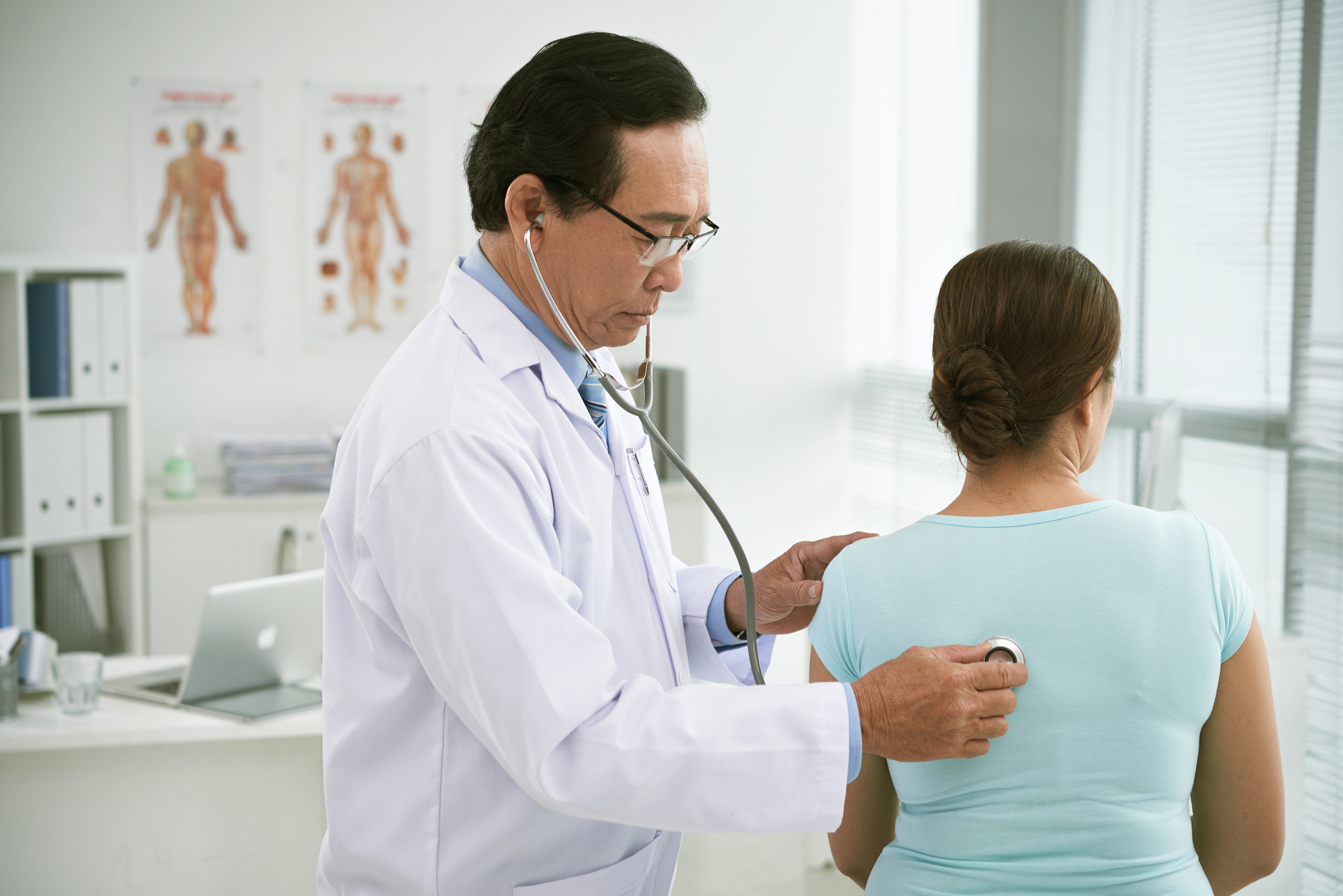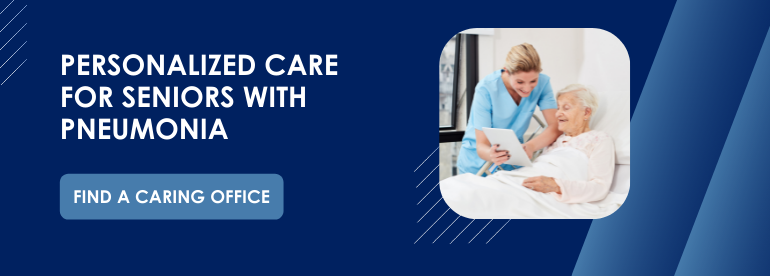Pneumonia is the 5th leading cause of death in seniors. So, it’s important for caregivers and family members of aging adults to understand this infection and help prevent it. In this post, we will review the basics of pneumonia, including what causes it and the common signs and symptoms to watch for.
What Is Pneumonia?
Pneumonia is an infection in the lungs. It causes inflammation of the air sacs (alveoli), where the body exchanges oxygen and carbon dioxide. These air sacs may also fill with pus or liquid. As a result, the body cannot get oxygen efficiently and individuals experience labored breathing and reduced oxygen to the blood.
What Causes Pneumonia?
Infection
Pneumonia can be caused by infection-causing microorganisms — bacteria, viruses, and fungi. Bacterial pneumonia is the most common cause of pneumonia in the US and can be the most serious. Viral pneumonia is more common in young children and is often very mild. Finally, pneumonia caused by fungi is more commonly found in individuals with chronic health problems or weakened immune systems.
These infection-causing microorganisms can be found in many places. They spread from one person to the next through direct or indirect contact, much like the spreading of a common cold. Therefore, they can be acquired in the hospital or in a senior living community. Or they can also be the result of saliva that wasn’t properly cleared from the lungs.
For example, someone with the infectious germs may cough into their hand and then shake hands with another individual. This contact could result in the spreading of the germs.
You might have heard that a cold or the flu can cause pneumonia, but that’s not quite right. Other infections can weaken the immune system, so the body can’t fight off the foreign bodies that cause pneumonia. So, pneumonia can develop as a secondary infection.
For example, bacteria from a cold could settle in the lungs. The body, which is already busy fighting off the cold, isn’t able to effectively eliminate the bacteria in the lungs and pneumonia develops as a separate infection.
In addition to the flu and the common cold, other common bacteria and viruses that could lead to pneumonia include:
- COVID-19
- Streptococcus pneumoniae
- Mycoplasma pneumoniae
- Group B strep (GBS)
- Staph
- Respiratory syncytial virus (RSV)
- Human parainfluenza viruses (HPIVs)
- Adenoviruses
Inhalation
There’s also another way that seniors can contract pneumonia, and that’s through inhalation or aspiration. Aspiration pneumonia happens when a senior accidentally swallows food or liquid into the lungs. This happens all the time — even to healthy adults. Usually, we are able to cough the substance out of the lungs. However, seniors may have weaker muscles and could be unable to produce the force necessary to cough up the food or liquid. If the substances remain in the lungs, the bacteria they carry can also get stuck in the lungs and begin to grow, leading to aspiration pneumonia.
Seniors who have experienced a stroke are prone to this type of pneumonia because many stroke survivors struggle with eating, chewing, drinking or swallowing.
The good news about this type of pneumonia is that there are many tips and tricks to help loved ones who struggle with swallowing avoid it. AND it’s not contagious! To discover some tips to avoid aspiration pneumonia see our infographic: Diet to Avoid Aspiration Pneumonia.
What Are the Signs and Symptoms of Pneumonia?
There are many symptoms associated with pneumonia. However, the symptoms can vary from person to person, making it difficult for seniors or their loved ones to recognize the infection. Some symptoms may also be very mild, making it hard for seniors themselves to notice them. That’s why it’s important for everyone to be aware of the potential signs and symptoms.
Below are some of the most common symptoms presented with pneumonia:
- Coughing: Pneumonia often causes a cough that results in green or yellow phlegm. This cough may also be accompanied by chest pain.
- Shortness of Breath: Pneumonia may cause belabored breathing, including rapid or shallow breaths.
- Weakness: Due to the lack of oxygen in the blood and the extra effort required to breathe, seniors may experience weakness, fatigue, or lack of energy.
- Confusion: Seniors may experience confusion or changes in mental sharpness as a symptom of pneumonia.
- Fever or Chills: Seniors may experience low body temperatures, fever, and chills. They may also experience sweating or shaking.
- Loss of Appetite: Pneumonia may cause a loss of appetite, although this may be a result of aging or other health conditions as well.
If you notice these signs in yourself or a loved one, see a medical professional who can provide a diagnosis and treatment options. Delaying treatment options could result in a serious health threat.
How Is Pneumonia Diagnosed?
A medical professional can diagnose pneumonia based on the symptoms. However, it can be difficult to pinpoint because the symptoms overlap with other infections. Doctors can also perform a physical examination or conduct diagnostic tests, like blood tests, pulse oximetry, or chest x-rays.
How Do You Treat Pneumonia?
Luckily there are several ways to treat pneumonia, so seniors can get back to feeling like themselves. These treatments could include the following:
- Prescription medication: Pneumonia caused by bacteria can be treated with an antibiotic. It's important for seniors to take all of the prescribed medication until it's gone, even if symptoms start to improve. Viral pneumonia cannot be treated with an antibiotic; however, a doctor may prescribe an antiviral medication to help with symptoms.
- Over-the-counter medication: In addition to prescription medication, seniors can also take over-the-counter medicines that may help with symptoms. Pain relievers or cough medicine may help calm the lungs so a senior can rest and recover.
- Rest: Getting enough sleep and resting while the body recovers may help seniors recover more quickly and reduce the risk of complications. While recovering, seniors may need to cease some of their daily activities until symptoms subside.
- Hydration: Seniors with pneumonia should drink plenty of fluids to avoid dehydration. Water can also help loosen the mucus in the lungs that has built up as a result of the infection, making it easier to expel from the lungs.
Depending on the type of pneumonia and the senior's health condition, recovery can take anywhere from 1 week to 8 weeks. During this time, a senior may need additional support and care. That’s where we come in. Our professional caregivers are specially trained to assist seniors with pneumonia to help them achieve recovery as soon as possible. Reach out to us today to learn more.


